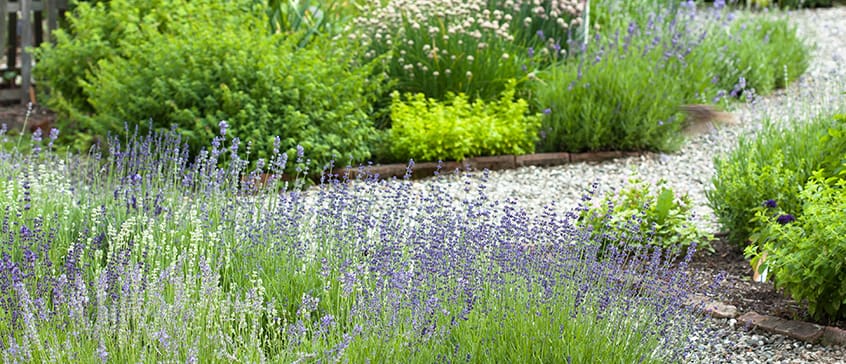Home / Science and the Environment / The importance of wildfire-resilient gardens
The importance of wildfire-resilient gardens

By instructor Bethany Couture
As wildfires become more prevalent due to climate change, creating wildfire-resilient gardens is more important than ever. These intentionally designed and managed landscapes not only add beauty to your property but also serve as a crucial defence against the spread of forest fires.
5 reasons for having wildfire-resilient gardens
If you live in, or next to, wild areas, here are some of the reasons why having a wildfire-resilient garden is essential:
Protection for your home
Wildfire-resilient gardens act as a buffer between your home and the encroaching flames and embers. By selecting fire-resilient plants that don’t easily ignite, and maintaining defensible space by strategically placing hardscaping elements like stone paths, gravel mulch, or fire-resistant fences, you can reduce the likelihood of fire reaching your house—offering much needed protection during a wildfire event.
Reducing fire spread
By minimizing dry debris, flammable vegetation and incorporating firebreaks into your landscape, your garden can help slow or even stop the spread of fire. A well-planned garden can serve as a natural barrier protecting not just your home, but also your neighbours and nearby areas.
Environmental benefits
When you choose fire-resilient plants, they are also often drought tolerant and low maintenance, making them ideal for sustainable and resilient gardens. These plants can thrive even in challenging conditions, helping to conserve water and support beneficial wildlife, all while enhancing fire safety. Native plants and vegetative perennials with large moisture-filled leaves are a great place to start when choosing fire-resilient plants for your garden.
Enhancing community safety
Creating a more wildfire-resilient garden is not just about protecting your home but also about contributing to the safety of your entire community. A fire-resilient property reduces the chances of a wildfire spreading to neighbouring homes and wildlands. By adopting these practices, you can inspire others to do the same and play a part in building a collective defence against wildfires.
Long-term cost savings
While the implementation of a wildfire-resilient garden may require an initial investment of fire-resilient plants and landscaping materials, it can save you money in the long run. Properly designed gardens reduce water usage, maintenance costs and the potential financial burden of wildfire loss. Certain municipal fire departments offer financial incentives for individuals and communities to enhance the wildfire resilience of their properties.
Start creating a unique and visually appealing landscape
Creating a wildfire-resilient garden isn’t just about taking practical, proactive steps in protecting your property, your community, and the environment, but can also be about creating a unique and visually appealing landscape. By embracing fire-resilient gardening practices, you help mitigate the risks of wildfires, while contributing to a more resilient future by enhancing the functionality of your landscape.
A great place to start making your garden more wildfire-resilient is to take the new class being offered with Continuing Studies at UVic—Wildfire Resilient Gardening. This workshop will help enhance your knowledge about fire-resilient design choices, plant and mulch selections, and water conservation practices.
You can also contact your local fire department to arrange a free FireSmart assessment of your home and garden property to identify vulnerable areas. With these two pieces of knowledge, you will be ready transform your home and landscape into a sanctuary that is both beautiful and wildfire-resilient.
About the instructor
 Bethany Couture is a sustainable horticulturalist from Victoria, BC and runs her business Garden Alchemist, which designs landscapes abundant with edible, medicinal, and native plants. Through her studies, she realized there must be more sustainable ways to cultivate sustenance from the land. This led her down the path of permaculture which wove together her passions for horticulture, herbalism, mycology, self-sufficiency and environmental sustainability. She holds a Permaculture Design Certificate and Permaculture Teacher Certificate, is the permaculture instructor at the Pacific Horticulture College and is the lead steward of the permaculture garden at the Horticulture Center of the Pacific.
Bethany Couture is a sustainable horticulturalist from Victoria, BC and runs her business Garden Alchemist, which designs landscapes abundant with edible, medicinal, and native plants. Through her studies, she realized there must be more sustainable ways to cultivate sustenance from the land. This led her down the path of permaculture which wove together her passions for horticulture, herbalism, mycology, self-sufficiency and environmental sustainability. She holds a Permaculture Design Certificate and Permaculture Teacher Certificate, is the permaculture instructor at the Pacific Horticulture College and is the lead steward of the permaculture garden at the Horticulture Center of the Pacific.
- Posted January 21, 2025
Visit Registration
2nd Floor | Continuing Studies Building University of Victoria Campus 3800 Finnerty Road | Victoria BC | CanadaTel 250-472-4747 | Email uvcsreg@uvic.ca
2026 © Continuing Studies at UVic
Legal Notices |
Sitemap

